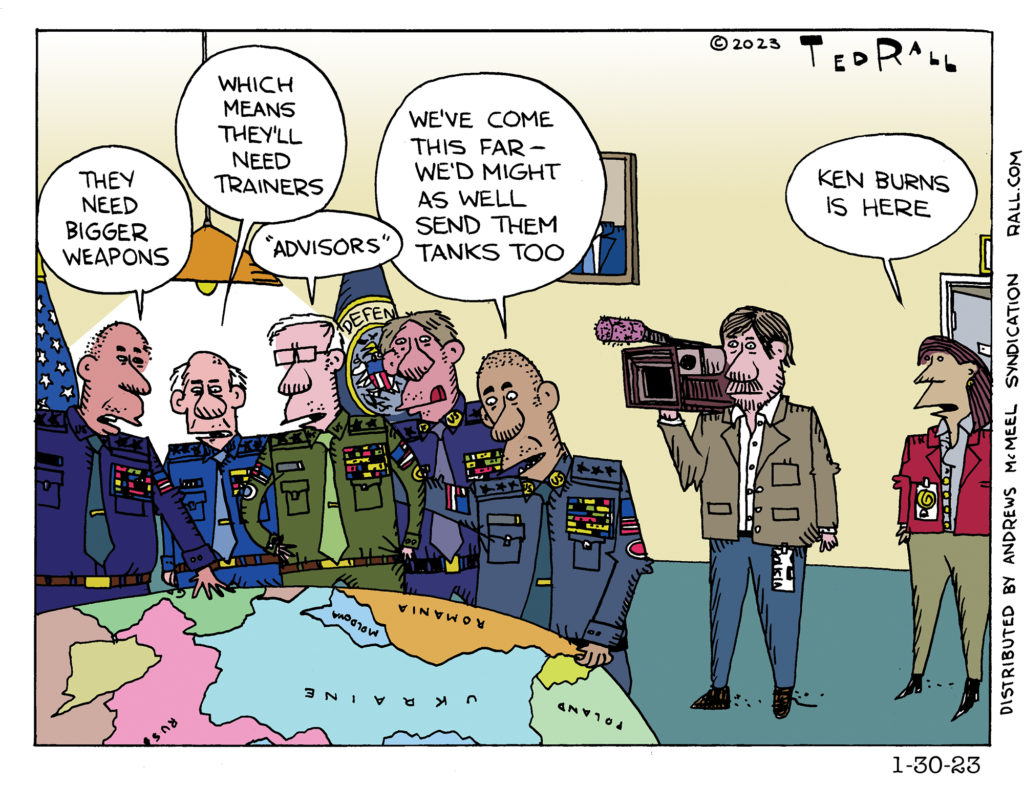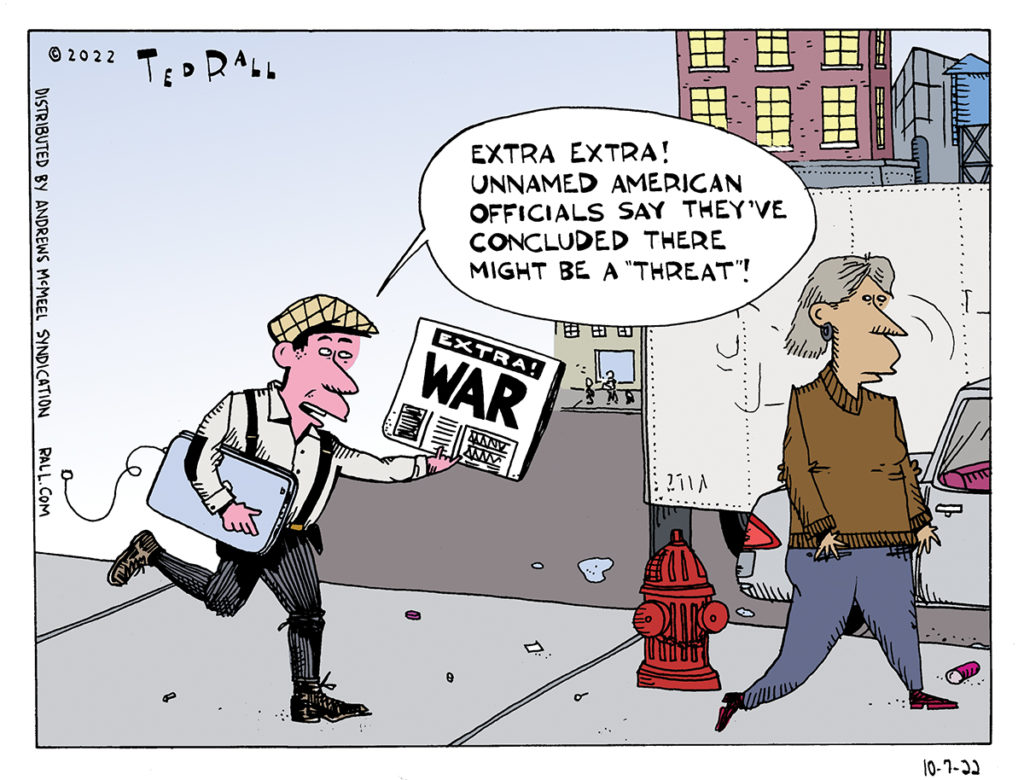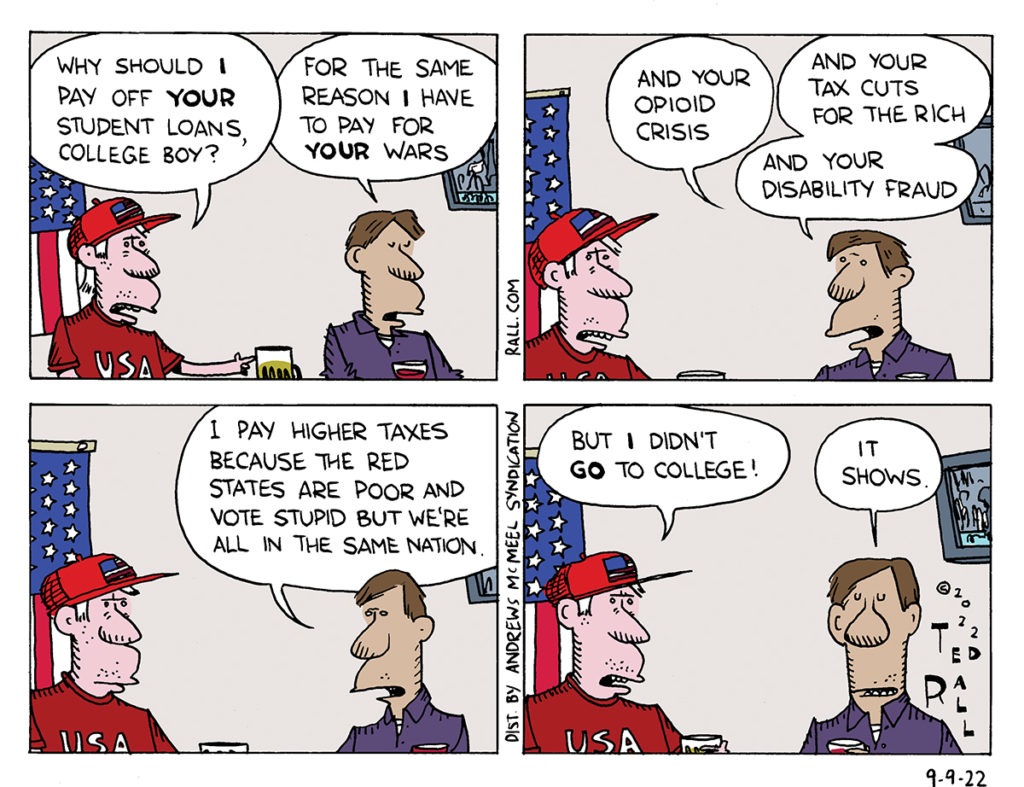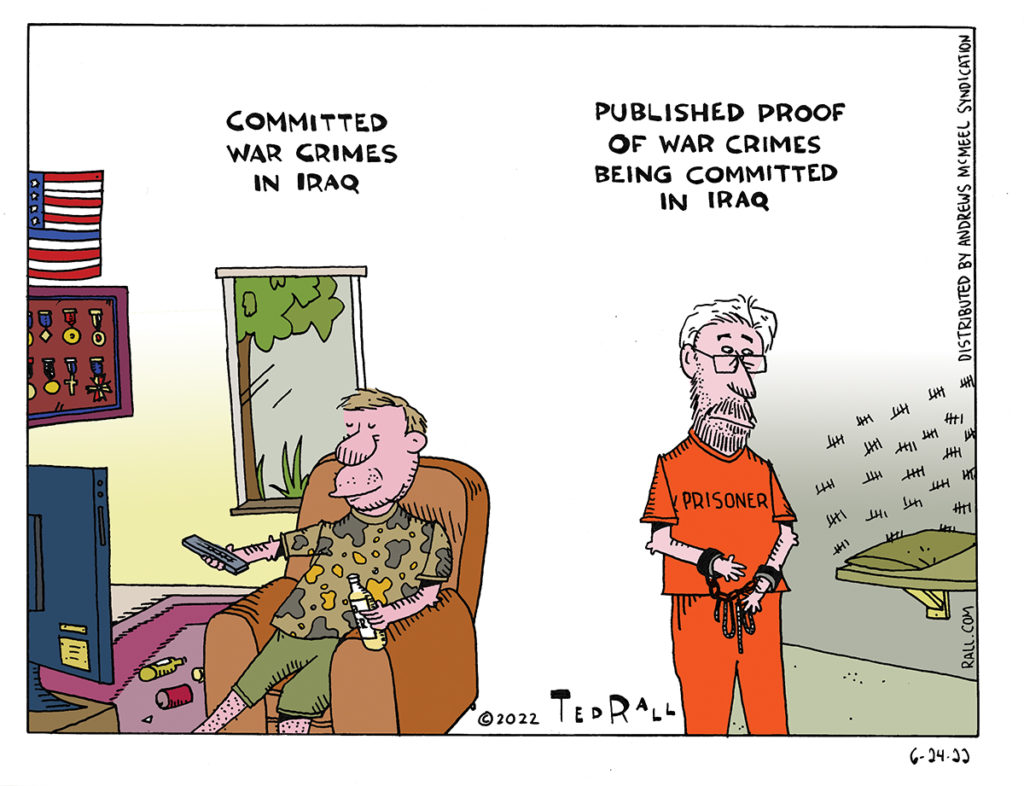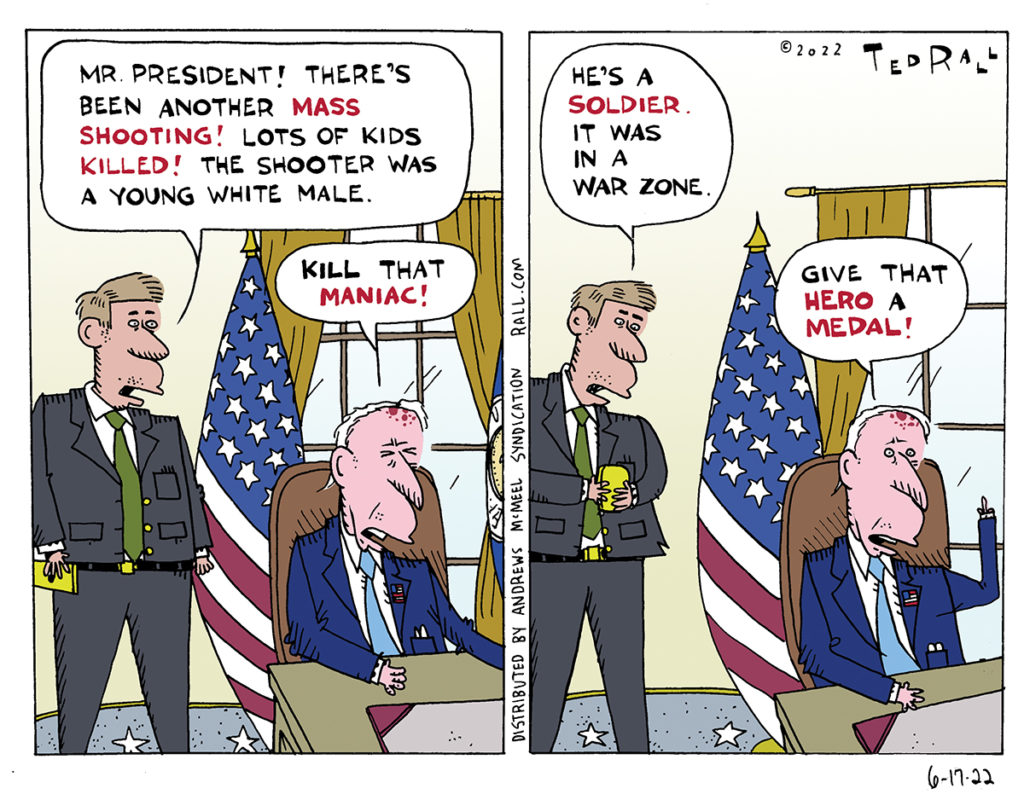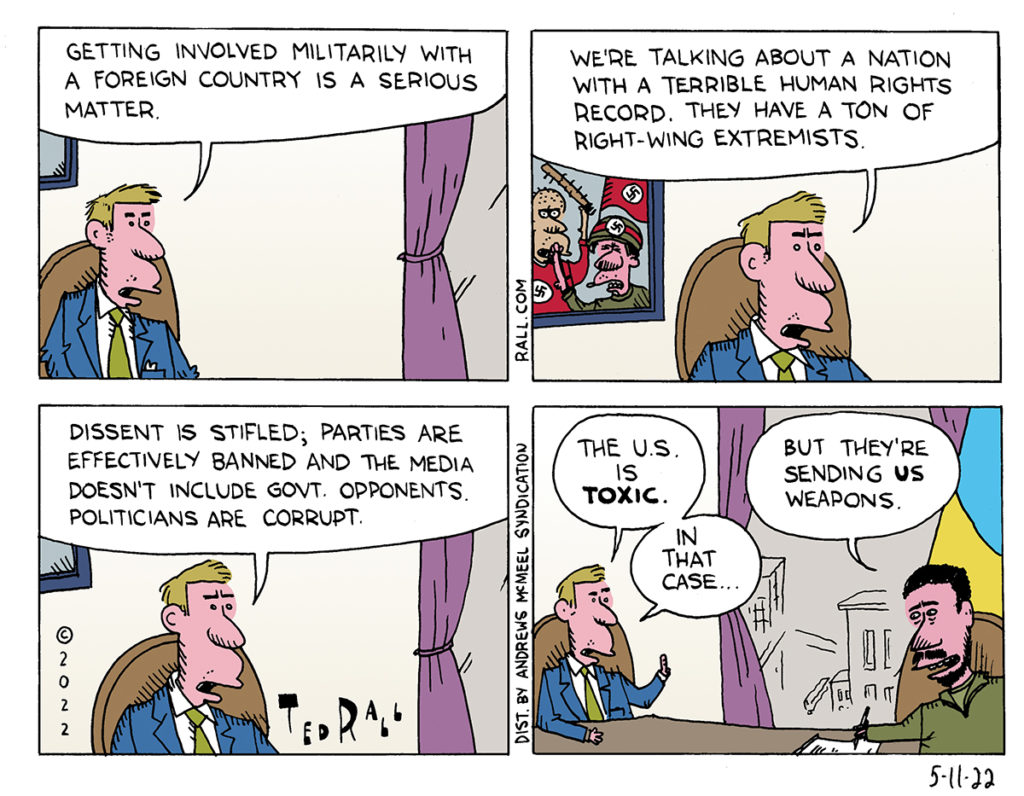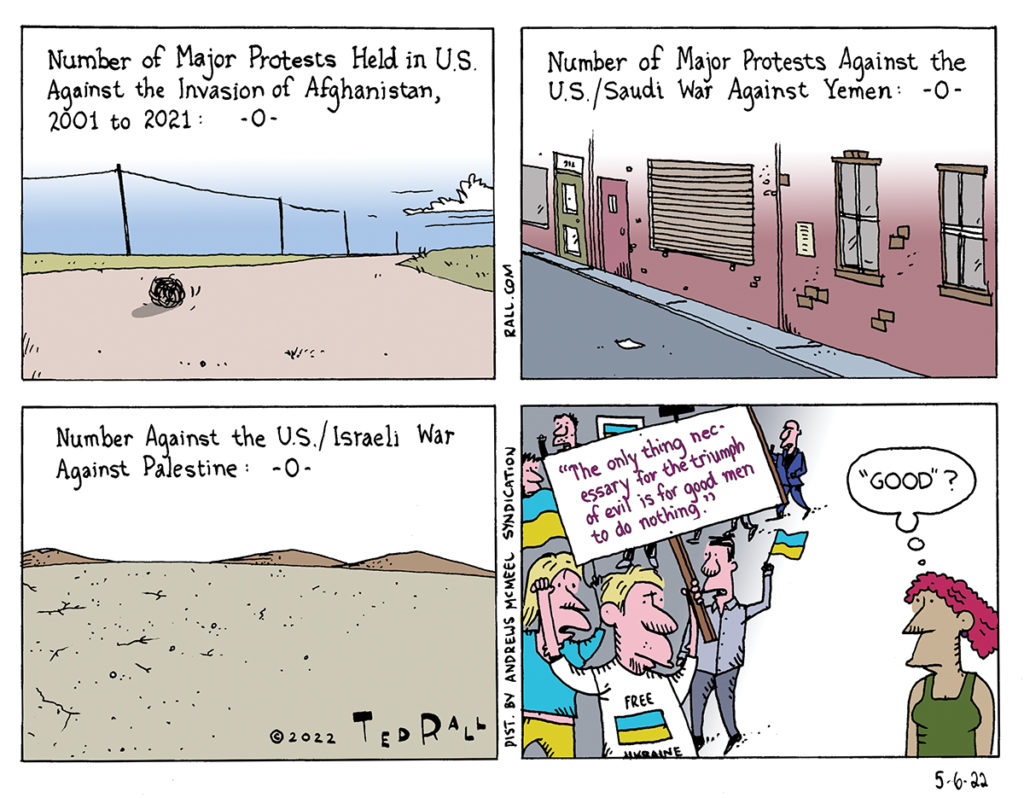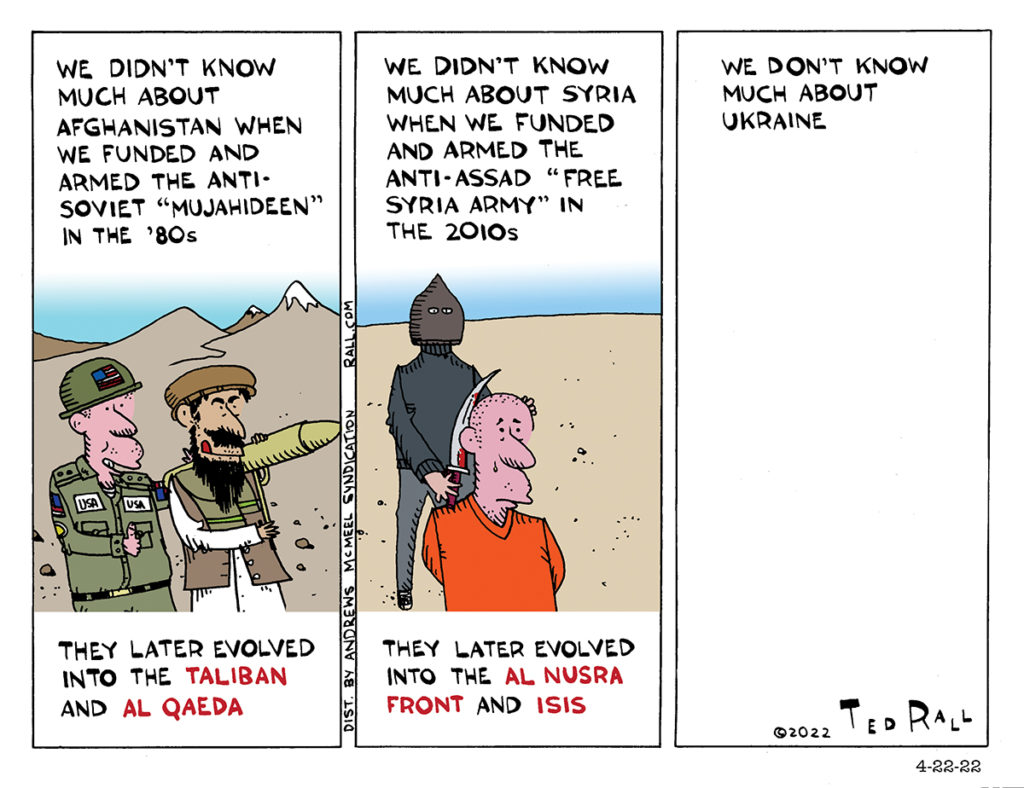Like the fisherman’s wife in the fairy tale, Ukraine keeps asking for more. More money, more weapons, more missiles, now more tanks. Reports say that they are now asking for U.S. fighter jets. Anyone familiar with the history of escalation that led to disaster in the Vietnam war, not to mention Afghanistan and Iraq, knows how this game ends.
Here’s What a Progressive Platform Looks Like
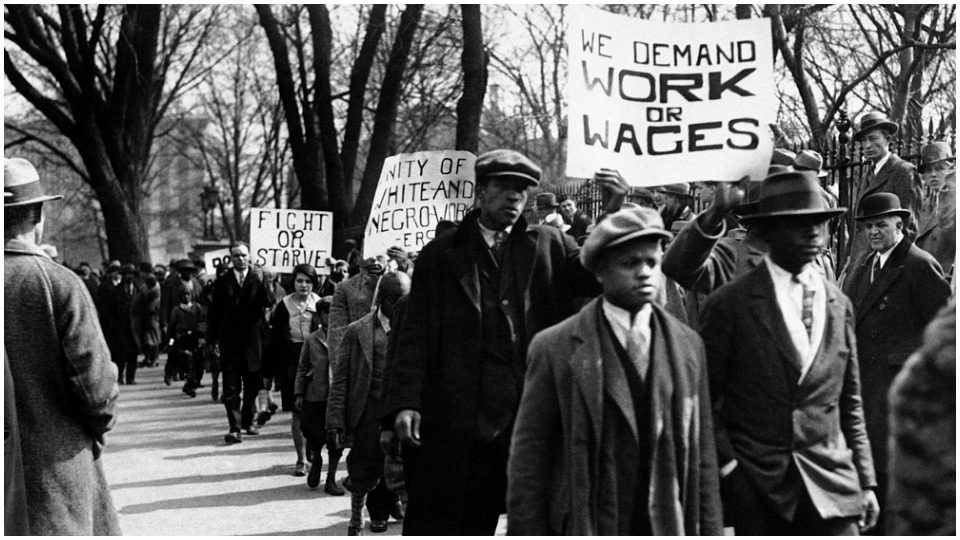
“Be realistic. Demand the impossible.” —Situationist slogan, 1968.
Demand #1: The $30-per-hour Minimum Wage.
Not phased in over so many years that today’s $30 is worth $20 by the time it takes effect. $30 an hour for all workers, no exceptions, now. This is an eminently reasonable demand. If anything, it’s too little to ask. $7.25 is a sick joke. Congress’ abdication of its moral duty to reward American workers for their extraordinary productivity by increasing the minimum wage at or faster than inflation has eroded the base salary since the Vietnam era. Corporate profits have soared as workers’ wages have stagnated.
The federal minimum wage was $1.60 in 1968. Adjusting for the official inflation rate, that’s $30.00 today. Let’s party like it’s 1968.
Demand #2: Free national healthcare.
Not market-based, not a hybrid—we need real, actual, universal healthcare. Every nurse and every doctor becomes a federal employee. Health insurance vanishes as a business sector. Every check-up, every test, every doctor’s visit, every medication, every surgical procedure is fully covered, no questions asked, as long as it’s approved by a physician.
This is not too much to ask. Germany, where only 0.5% of the population is uninsured, pays only 10.7% of GDP for healthcare, compared to 16% here in the U.S. Norway, where hospitals are operated by the government, has a $210 per citizen per year deductible after which the government picks up the tab for everything; like Germany, overall healthcare costs in Norway are about 60% of ours.
Throw in dental, vision and mental health.
Demand #3: Slash military spending by 80%.
We’re not the world’s policeman. We’re its deranged serial killer. The U.S. squanders $800 billion a year to invade, occupy, assassinate, intimidate and bomb people who mean us no harm and destroy their infrastructure. That’s more than the next nine biggest-spending militarist nations combined. And those countries total 10 times our population.
Slashing the Pentagon budget would make the world safer. Fewer U.S. wars and proxy wars would reduce anti-Americanism and thus reduce the chance of another terrorist attack, save thousands of American lives and millions of people overseas, not to mention massively helping out the environment.
Those savings would easily cover…
Demand #4: Free four-year college.
Young Americans have long been coerced into a devil’s bargain: without a college degree, they’ve been told, you won’t land a decent-paying job. College is insanely expensive so you’ll have to accept the burden of student loan debt. If you don’t make enough money after graduation due to bad luck or a bad economy or a changing workplace, too bad, you still have to pay. You can’t even discharge the loans in bankruptcy.
If the corporations who own our politicians require job applicants to have a college degree, a college degree should be free. 39 countries have free college. We deserve, and can afford, the same as Kenya, Iceland and Panama.
Demand #5: Leadership to ban the most frightening weapons.
As the world’s most aggressive militaristic nation and its biggest international arms dealer, only the U.S. has the standing and power to stop the arms races we’re starting. The U.S. should forswear its currently-stated, insane option of launching a nuclear first strike and invite all other nuclear powers to make the same commitment. It should join the 80% of the world’s nations that have pledged not to use landmines. It should ban drone-based weapons in its military, police and civilian sectors and demand that other nations do the same. The world must come together to ban lethal autonomous weapons; the U.S.’ early lead in this technology gives it leverage to lead the way.
More to come.
(Ted Rall (Twitter: @tedrall), the political cartoonist, columnist and graphic novelist, co-hosts the left-vs-right DMZ America podcast with fellow cartoonist Scott Stantis. You can support Ted’s hard-hitting political cartoons and columns and see his work first by sponsoring his work on Patreon.)
1000 Words and Nothing to Read
Despite official media ethical guidelines that deplore the use of anonymous sources, major national news outlets continue to publish articles leaked by anonymous government officials without any sourcing whatsoever, often purely based on speculation. Unfortunately, it’s not easy to ignore this nonsense.
Democracy Isn’t a La Carte
The most effective Republican talking point against Joe Biden’s attempt to forgive outstanding student loans is that people who didn’t go to college shouldn’t have to pay for those who did. But in a country as big as the United States, everyone inevitably has to pay for other people’s choices and politics.
Biden is Giving $40 Billion to Ukraine. Here’s What That Money Could Do Here.

On top of the $2 billion it already sent to Ukraine, the Joe Biden Administration has asked Congress to ignore its previous request for a $10 billion to pay for updated COVID-19 vaccines for American citizens (pandemic? what pandemic?) and send an additional $33 billion to Ukraine instead. The House of Representatives not only obliged, but authorized more than Biden wanted, $40 billion.
The U.S. Congress does this with military spending all the time. They live to please!
Every Democratic congressman voted “yes” to send weapons to a country that has “several hundred monuments, statues, and streets named after Nazi collaborators,” according to The Forward. That even includes AOC’s “Squad,” who claimed to be progressive.
In the Senate, a rare voice of opposition was raised by libertarian Republican Rand Paul. “We don’t need to be the sugar daddy and the policemen of the world,” Paul remarked. For his trouble, Paul was bizarrely accused of “treason” by online commenters who suggested that his surly Kentucky neighbor should assault him again. All Paul wanted was a week to go over exactly where all that money is going.
Whatever you think of the crisis in Ukraine, Paul has a point. A week isn’t going to make any difference. We should distrust bullies who tell us there’s no time to think, hurry up, shut up, do what we tell you. The total lack of debate in Washington, and in the news media, over the quick transfer of $40 billion to a country that is not a U.S. ally, has a grim human rights record and recently banned a bunch of political parties and opposition cable news channels, ought to prompt some sort of discussion. First and foremost, we ought to consider just how much money $40 billion is and what it could do here in the United States, for Americans.
The $40 billion we are sending to Ukraine will not change the outcome of the war. The United States would never commit enough money or ground troops to do that because it would risk World War III with Russia. The $40 billion will buy a lot of weapons and ammunition that will kill Russians and Ukrainians—nothing more, nothing less.
So how much, exactly, is $40 billion?
Here in the United States, here are some of the things that $40 billion could do:
A $2,000 scholarship for every college student.
A $6,000 scholarship for every college student who is officially in poverty.
$72,000 to every homeless person.
$2,400 to every veteran.
$410,000 to every public school.
$1.3 million to every public high school. It could be used to buy books and other equipment, fix broken infrastructure, build something new for the kids. $1.3 million would pay the salaries of 20 new teachers for 10 years.
$500 to each American family. I pledge to use my $500 not to kill any Russians or Ukrainians.
$420 to every cat. That’s a lot of kibble and litter. Cats don’t kill Russians or Ukrainians.
$2 million each to every person wrongfully convicted of a murder they didn’t commit.
Give a new, fully-loaded car to a million people.
Give a sweet, fully-loaded Macbook Pro laptop to 10 million people.
Give a sweet new TV to 100 million people.
Everyone who currently subscribes to Netflix gets three years for free.
Every adult gets a free subscription to the Washington Post digital edition for three years.
Every adult gets 15 free tickets to the actual, real, in-person, not-at-home movies.
$40 billion would repair almost all of the 220,000 bridges in the United States that need to be repaired and replace all of the 79,500 that need to be replaced. Add the $2 billion we already sent to Ukraine and you can delete the word “almost.”
$40 billion would buy Twitter.
$86,000 for everyone raped over the last year.
$7,000 to help the caregivers of everyone suffering from dementia.
It would hire 50,000 journalists for 20 years. There are only 6,500 now.
$4,000 to every self-identified Native American and Alaska Native. It’s not nearly enough considering what has been done to them, but it’s better than the current nothing.
What if, for some strange reason, we don’t want to use that $40 billion to help our own people right here at home, one out of nine of whom is officially poor—some of whom are actually starving? While the inclination to shovel money at other countries while so many of our own citizens are suffering is nearly impossible to understand, some people (the President, several hundred members of Congress) have such a mindset and therefore must be addressed.
If we’re looking for a country in dire need of, and richly deserving of, $40 billion, we need look no further than Afghanistan.
Afghanistan, which the U.S. brutally occupied for 20 years after invading without just cause, is suffering from the biggest humanitarian crisis in the world. Half its population—20 million people—is suffering from “acute hunger,” according to the UN. The nation collapsed because the U.S. pulled the plug on the economy when it withdrew, imposed draconian economic sanctions in a fit of spiteful pique and seized $7 billion in Afghanistan government funds. Biden has promised a little aid, though none has shown up in Kabul.
From the Intercept: “A senior Democratic foreign policy aide, who was granted anonymity to openly share his thoughts on the Biden administration’s actions, said the policy ‘effectively amounts to mass murder.’ According to the aide, Biden ‘has had warnings from the UN Secretary General, the International Rescue Committee, and the Red Cross, with a unanimous consensus that the liquidity of the central bank is of paramount importance, and no amount of aid can compensate for the destruction of Afghanistan’s financial system and the whole macro economy.’”
Democrats recently joined Republicans to vote no on a modest proposal to study the effect of U.S. sanctions against the Afghan people.
Then again, we really do need that COVID money.
(Ted Rall (Twitter: @tedrall), the political cartoonist, columnist and graphic novelist, is the author of a new graphic novel about a journalist gone bad, “The Stringer.” Order one today. You can support Ted’s hard-hitting political cartoons and columns and see his work first by sponsoring his work on Patreon.)
Wars Make Bad Badfellows
Many Americans are skeptical about military support for Ukraine given that country’s dismal human rights record and autocratic political system. One might also wonder why any other country would want to get into a relationship with the United States.
The Only Thing Necessary for Evil to Triumph
“The only thing necessary for the triumph of evil is for good men to do nothing.” That statement is often misattributed to Edmund Burke. After Russia invaded Ukraine, many Americans who didn’t have anything to say about the invasion of Afghanistan or Iraq, much less torture at Guantánamo and elsewhere, or Yemen, or Palestine, suddenly started wearing blue and yellow flags. They weren’t good before, so how can these self-serving souls think they are suddenly being good now?
We Don’t Know Much
The United States has a habit of arming and funding sides in civil conflicts that later become enemies. Here we go in Ukraine, supporting a questionable government of a country Americans couldn’t find on a map two months ago.

